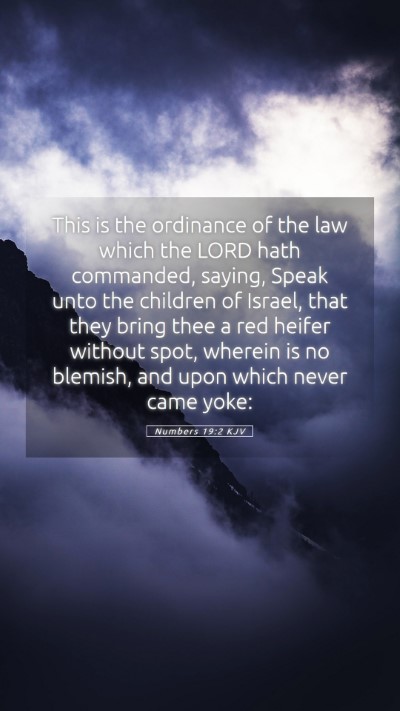Understanding Numbers 19:2
Verse: "This is the ordinance of the law which the LORD hath commanded, saying, Speak unto the children of Israel, that they bring thee a red heifer without spot, wherein is no blemish, and upon which never came yoke."
Overview: Numbers 19:2 introduces the command regarding the ritual of the red heifer, which holds significant importance in the purification rituals of the Israelites. This instruction comes directly from God, emphasizing its divine origin and necessity for the people of Israel.
Commentary Insights
- Matthew Henry's Commentary:
Henry emphasizes the red heifer's purity, indicating that only a flawless animal could fulfill this sacred role. The red heifer symbolizes the need for purification among the people, particularly relating to the concept of sin and the consequences of defilement. It also serves as foreshadowing for Christ, the ultimate sacrifice.
- Albert Barnes' Notes:
Barnes notes that the heifer’s color, without spot or blemish, denotes perfection, which is crucial for its intended purpose. He explains that the ritual involving the heifer symbolizes a means by which the Israelites could be cleansed from sin, indicating a path for restoration with God. The mention of the heifer being one that has never borne a yoke signifies total dedication to the divine purpose, untainted by human use.
- Adam Clarke's Commentary:
Clarke elaborates on the ceremonial nature of the red heifer and its implications for the community. He discusses the connection between this ritual and themes of life, death, and the hope of resurrection. The heifer, by its sacrificial nature, serves to remind the Israelites of their need for constant purification and the importance of adhering to God's commands.
Thematic Significance
This verse encapsulates several key themes in Biblical exegesis and scripture analysis:
- Purity and Sacrifice:
The requirement of a red heifer without blemish signifies the high standards God sets for offerings, reflecting the ultimate need for purity in worship and sacrifice.
- Divine Command and Obedience:
Emphasis on speaking to the children of Israel underscores the importance of communication in divine instructions — obedience is critical for maintaining a relationship with God.
- Foreshadowing of Christ:
The red heifer is often interpreted as a typological foreshadowing of Jesus, representing ultimate sacrifice and the means of purification from sin for believers in the New Testament.
Cross References
- Leviticus 4:3-12: Discusses the sin offerings and the importance of unblemished animals.
- Hebrews 9:13-14: Compares the blood of animals used in sacrifices to the blood of Christ for purifying the conscience.
- 1 Peter 1:19: Refers to Christ as the lamb without blemish and speaks to His redemptive sacrifice.
Application of the Verse
This verse invites us to consider our lives in light of God's holiness and the need for purification. For modern believers, it poses questions on how we approach God and maintain our spiritual cleanliness through Christ, who fulfills the requirement of a perfect sacrifice.
Bible Study Insights
For those engaging in online Bible study or participating in Bible study groups, Numbers 19:2 offers profound lessons on purification, sacrifice, and divine obedience. It provides fertile ground for discussion on contemporary applications of these ancient rituals and their meanings for our lives today.
Conclusion
This verse is foundational for understanding many theological constructs surrounding sin, purification, and the ultimate atonement through Jesus Christ. Studying Numbers 19:2 in conjunction with the provided commentaries, cross references, and themes enriches one's grasp of both Old and New Testament teachings, facilitating deeper insights into scripture and personal faith.


